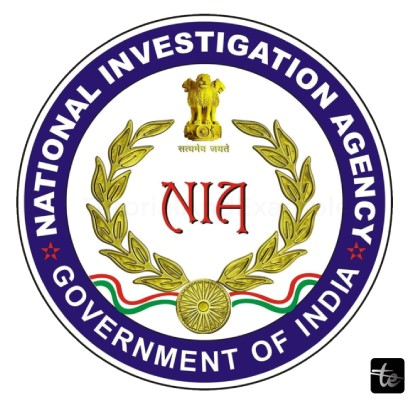Full Form of NIA
In India, the National Investigation Agency (NIA) is a specialist law enforcement organization that targets terrorism. Under a formal declaration from the Ministry of Home Affairs, the Agency is authorized to handle the investigation of terror-related crimes throughout the states without the need for special permission from the states. The National Investigative Agency's main duty is to look into and prosecute crimes that impact both domestic and international borders, emphasising terrorist activity, rebellion, and other relevant subjects. It can look into dangers to India's honesty, safety, and independence. It can collect evidence, keep an inventory of terrorist organizations and their members, and make arrests in addition to conducting search and seizure.

The National Investigation Agency Act 2008, approved by the Indian Parliament on December 31, 2008, gave rise to the Agency following the terrorist assault in Mumbai on December 26, 2008. Following an assault that demonstrated the inadequacy of surveillance and the inability of Indian authorities to monitor such actions, the government of India recognized the need for the creation of the NIA to address terror-related incidents throughout the country. The National Institute of Addiction Studies (NIA) is based in New Delhi and maintains branches in Hyderabad, Guwahati, Kochi, Lucknow, Mumbai, Kolkata, Raipur, Jammu, Chandigarh, Ranchi, Chennai, and Imphal. It maintains the NIA Most Wanted list.
Flag of NIA:

Nine Fast Facts from the National Investigation Agency (NIA)
- The nation's primary counterterrorism enforcement organization is the NIA. In 2008, following the Mumbai terror assault of that year, it was founded.
- Without requesting approval from state legislatures, the NIA can look into terror-related cases anywhere throughout the nation.
- The institution looks into crimes involving nuclear installations, making war against the nation, and terror.
- Following the passage of the National Investigation Agency Act 2008 by Parliament, it became operative.
- The organization wants to develop into a professional investigative organization that satisfies international standards.
- In addition to serving as a repository for terrorist data, it also seeks to act as a deterrence to current and prospective terrorists.
- The government's Ministry of Home Affairs oversees the NIA's operations.
- With eight regional offices spread throughout India, the Agency's head office is in New Delhi.
- A Director-General, an IPS officer, is in charge of it.
- The "NIA Most Wanted List" is upheld by the NIA.
Regional Offices of the National Investigation Agency (NIA)
- NIA Guwahati NIA Hyderabad
- NIA Lucknow's Kochi NIA
- NIA Mumbai
- NIA in Kolkata
- NIA Raipur NIA The Jammu NIA Mission
The following are the NIA's declared missions:
- Use the most recent scientific techniques to investigate the scheduled offences professionally.
- Encouraging a prompt and efficient trial.
- Transforming into a professional, goal-oriented organization that respects the Indian Constitution and the country's regulations and places a high value on human rights and dignity.
- Exposing employees to the best standards and providing frequent training will help to develop a competent staff.
- Exhibiting a spirit of advancement and a scientific temperament while performing their jobs.
- Using the newest technologies and cutting-edge techniques in NIA operations.
- Maintaining friendly ties with the national government, state governments, and other security organizations.
- Supporting the states along with other organizations in their investigation of incidents involving terrorism.
- Make a database including all the details about terrorists and distribute it to states and other organizations.
- Examining and recommending necessary modifications to India's anti-terrorism laws regularly.
- Gain the trust of the populace by making bold and selfless attempts.
Authority: National Investigation Agency
The National Investigation Agency has been given all the authority and privileges necessary to conduct inquiries under the statutes listed in the NIA Act's Schedules Book. Considering the legal parameters outlined by the NIA Act, state legislative officials may seek an inquiry by the NIA with the federal government's agreement.
Anywhere in India, the government at the national level can send cases for inquiry to the NIA, and the officers tasked with processing such instances are members of the IRS and IPS cadres.
The 2019 NIA (Amendment) Act:
The Parliament passed the NIA (Amendment) Act 2019, which the president ratified in July of the same year. This legislation introduced A few significant amendments to the 2008 NIA Act.
Below is a discussion of the changes:
The modification permits the Agency to look into the subsequent new offences as well:
1. Trafficking in persons
- Banknote or counterfeit cash-related offenses
- Manufacturing or selling of weapons is prohibited.
- The Chief justices of the local High Courts advise the Government of India on
- Crimes about the Explosive Chemicals Act of 1908
- Terrorism via the Internet
2. The amendment further broadens the NIA's purview. It can now look into crimes perpetrated beyond Indian territory covered by international agreements and other countries' laws.
3. The change also permits the federal government to establish Special Courts to try cases involving scheduled offences. As a result, the Chief Justice of the High Court, the body that oversees the Sessions Court, shall be consulted before the government appoints these courts as special courts.
- Additionally, the Act gives state governments the power to name Special Courts.
- The government may designate more than one Special Court in a given territory.
- There are now 7 Special NIA Courts in UTs and 38 Specialized NIA Courts in states.
- The Chief justices of the local High Courts advise the Government of India on appointing judges to the Special Courts.
- The accused's trial for a different case before a different court is subordinate to the proceedings conducted by the NIA Special Courts.